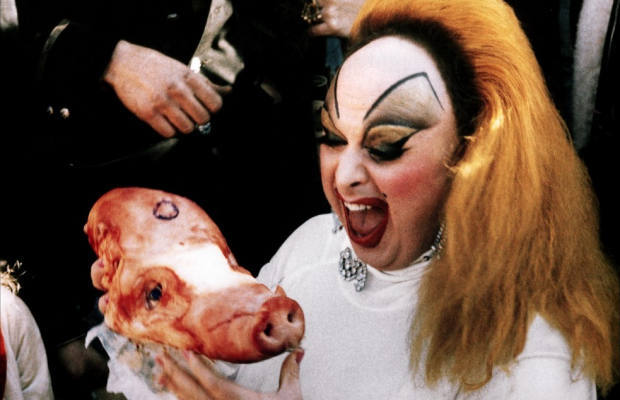
Campy films don’t appeal to everyone, but there’s certainly a devoted audience for that brand of kitschy artifice and over-the-top style. For those who can appreciate some excess in their art, these ten underrated masterpieces of camp are absolute must-sees.
1. Barbarella (1968, Roger Vadim)
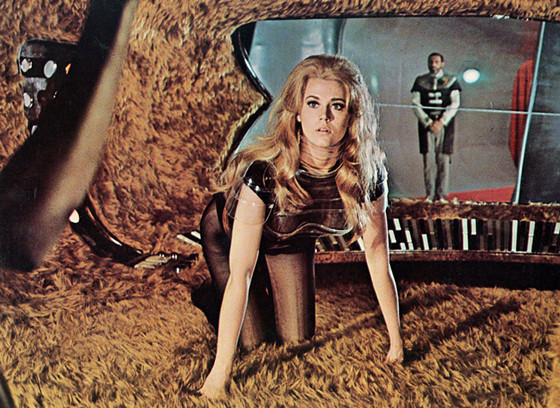
There’s a fun test of gender equality in films – an alternative to the more common Bechdel test – in which you ask yourself if a central female character could be replaced by a sexy lamp without affecting the plot in any significant ways. If she can, then the film has failed the test and it’s clearly flawed as well as most likely borderline misogynistic. Barbarella would not pass the sexy lamp test.
The sci-fi/comedy occasionally borders on softcore pornography in the way it objectifies Jane Fonda’s eponymous protagonist, an American astronaut sent to another planet to bring a man back to Earth from a distant hostile planet. Fonda cycles between nearly a dozen skimpy outfits and repeatedly gets out of absurd situations purely by making use of her ample sex appeal, essentially reducing the character to her body.
Yet, despite all this, the film somehow manages to exude an effortless charm with its self-consciously cheesy production values and campy sense of humor. It’s hard to dislike a movie in which Jane Fonda accidentally overloads a sex machine because she’s literally too sexy for it.
For all its subtle and not-so-subtle objectification of Fonda, the film is by some miracle ridiculous enough for the sexism to become part of the joke; it’s not quite forgivable, but everything about Barbarella is so over-the-top that you simply can’t take it seriously. If there’s one sexy lamp movie worth salvaging, it’s this one.
2. Cry-Baby (1990, John Waters)
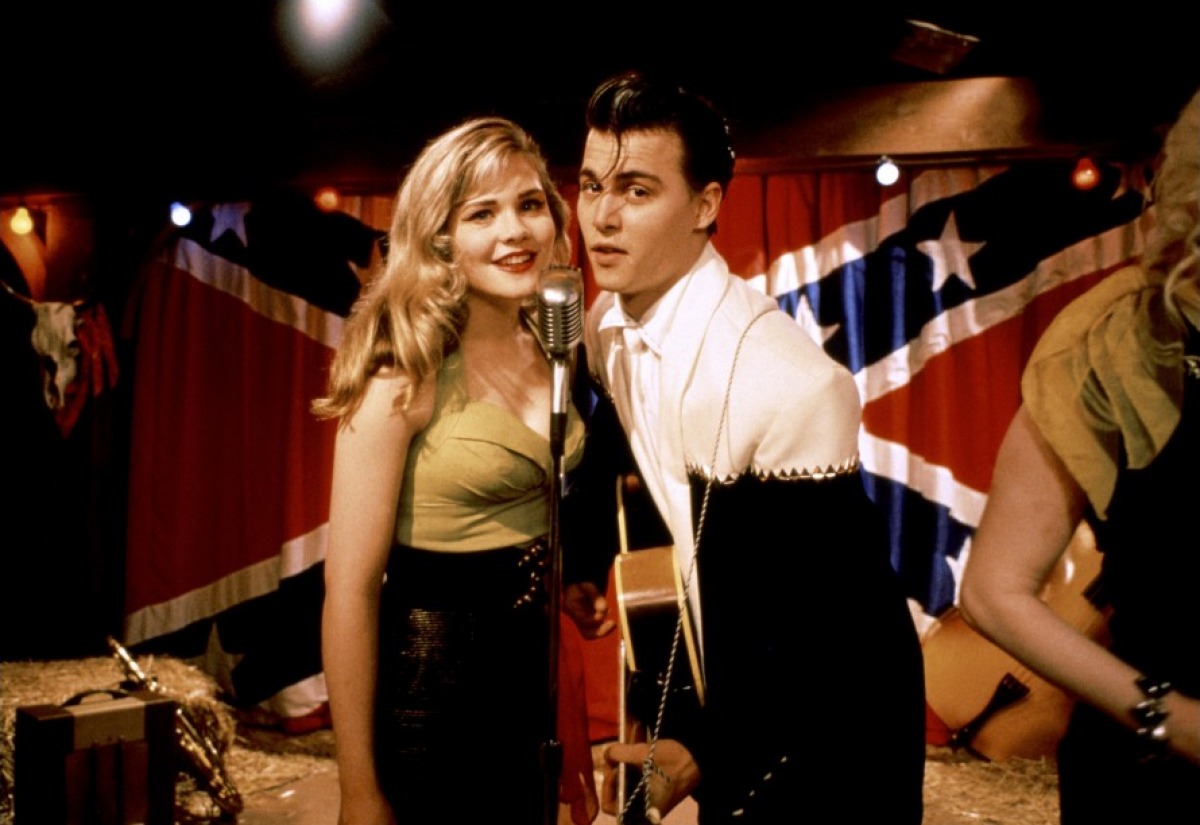
John Waters deserves his reputation as the self-proclaimed king of bad taste, having crafted some of the most giddily trashy films of the ‘70s. The late ‘80s and early ‘90s, however, saw him dipping his toes into slightly more mainstream commercial filmmaking – albeit his own twisted take on mainstream and commercial.
As bizarre and incredible as his more popular film Hairspray is, Cry-Baby is the pinnacle of this second phase of his career. The most immediately stunning aspect of the film is the wildly unconventional cast.
Front and center you’ve got Johnny Depp mere months before he skyrocketed to fame in Edward Scissorhands, this time starring as a surprisingly sensitive ‘50s teen rebel who falls in love with a “square” girl.
The character of Cry-Baby is and always will be one of the best roles of his career; everything about it hits the mark, from the lone strand of hair that dangles forward from his slicked-back greaser cut to the proto-sadboy face he makes as a single tear streams down his face early in the film.
Meanwhile in the ensemble supporting cast there’s Hairspray star Ricki Lake, punk icon Iggy Pop, former underage porn star Traci Lords, Warhol superstar Joe Dallesandro, and, best of all, high-profile kidnapping victim and bank robber Patty Hearst.
That cast is worth the price of admission alone, but beyond that the film is simply John Waters at his self-aware, wildly hilarious best. It’s a high-camp musical marriage of Rebel Without a Cause and Romeo And Juliet that only he could have made, and it stands even today as a highlight of both his career and ‘90s teen movies in general.
3. Grease 2 (1982, Patricia Birch)
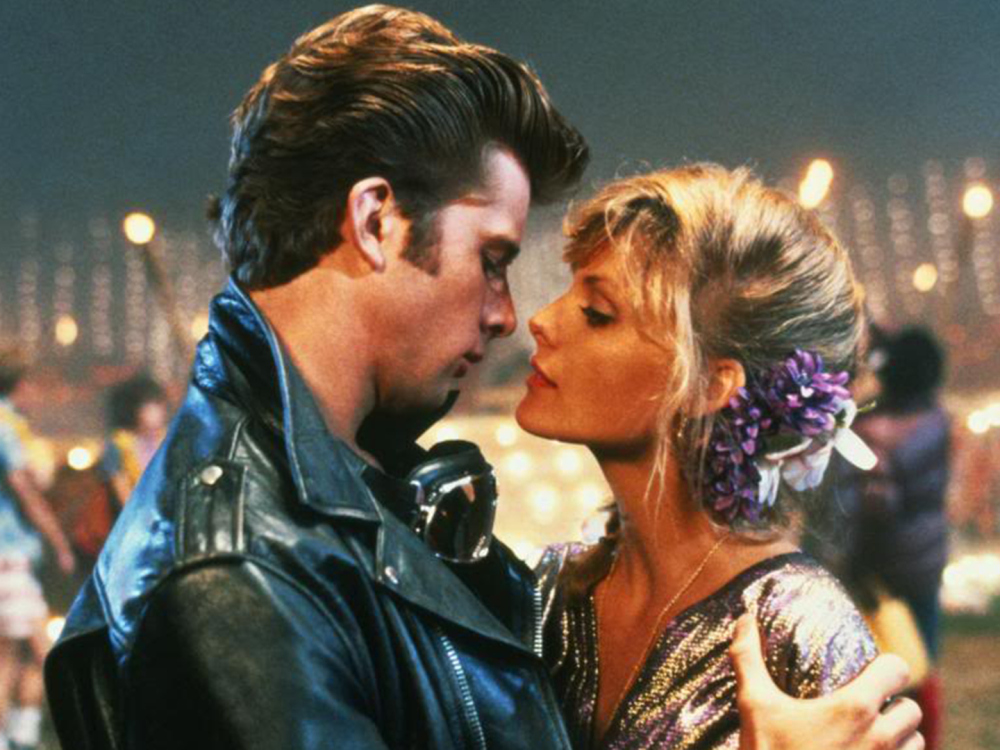
There’s a fine line between campy fun and incompetent filmmaking, and Grease 2 stands firmly balanced on that line.
It’s not “well-made” in the conventional sense of the term, and in fact any broad description of its overall quality is probably irrelevant. It’s not good or bad, it’s simply Grease 2: strange, jaw-dropping, misguided, and painfully compelling.
Imagine a train flying off the tracks in slow-motion, and everyone in the train is on fire and the train is hurtling off a bridge towards a tsunami and the tsunami is filled with bloodthirsty sharks that are somehow also on fire. Multiply that by ten and you’ve got the miracle/monstrosity that is Grease 2.
Tenuously connected to the original film, it stars Michelle Pfeiffer and someone who once voiced James Bond in a videogame as the leader of the Pink Ladies girl gang and a dorky transfer student who falls in love with her, respectively. So if the cast is different across the board and the characters are all new, how is it connected to Grease at all?
Well luckily the film makes a point of informing the audience that the love-struck protagonist is a distant cousin of Sandy from the first film, so you don’t have to worry about minor details like continuity or narrative coherence while you struggle to process the many iconic song-and-dance numbers.
Those musical numbers are the backbone of the film, and boy oh boy do they deliver. There’s everything from a duet about nuclear annihilation making teenagers horny to a deeply uncomfortable song about sex-ed that is absolutely positively impossible to forget, no matter how hard you may try.
The latter song, simply titled “Reproduction,” is one of the great triumphs of musical film history as well as the epitome of Grease 2’s is-it-trash-or-is-it-brilliant style.
That song alone makes Grease 2 a must-see, but add on top of that the ham-fisted dialogue, bizarre costuming choices, and a (surprisingly) feminist message and it becomes clear that there is nothing else like this movie out there, and it’s doubtful there ever will be.
4. Popeye (1980, Robert Altman)
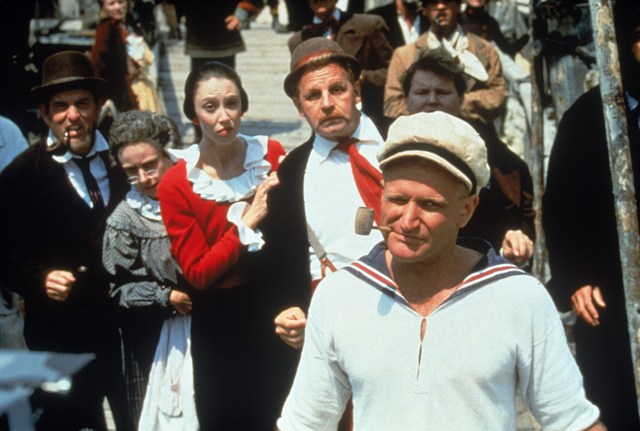
I know what you’re thinking: “But Joey, Popeye is known far and wide as a stain on the legacies of both Robert Altman and American film history! You can’t include that on your list!” You’re so naïve.
When people trash Altman’s goofy musical take on Popeye, they seem to forget that one of his many trademarks as a director is his wild versatility; no two movies by him are quite the same, so his decision to make an eccentric children’s movie only a few years after such distinguished films as 3 Women and Nashville should hardly come as a surprise.
The truth is Popeye isn’t thoughtful or haunting or really any adjectives you could use to describe most of Altman’s work, but god damn is it charming! And with a cast led by a fresh-faced Robin Williams and Shelley Duvall in her prime – watch this film back-to-back with her other high-profile 1980 film The Shining for a quirky double-feature – how could it not be a good time?
Williams, in his first starring role ever, is endearing beyond comprehension in his intense commitment to the role (as well as weirdly attractive despite the unsettling forearm prosthetics he’s wearing?), and Shelley Duvall is just as wonderful if not more so as his comic foil Olive Oyl.
Clumsy and accident-prone as Olive Oyl is, Duvall plays her with just enough defiance and self-assuredness that she feels like a full character rather than a passive damsel-in-distress; she has depth, which is hardly to be expected when you sit down to watch a movie about a cartoon sailor with daddy issues.
And, to Robert Altman’s credit, it really does feel like a cartoon. Altman really went all out in emulating the aesthetic of the original comics and TV show; the absurd visual gags, detailed costumes, and giddily incoherent plot all pay clear homage to the film’s source material. That said, its cartoonish feel hardly indicates a lack of depth.
There’s a surprising amount of tenderness lurking under the surface, especially in the interactions between Popeye, Olive Oyl, and Swee’pea – the film’s holy trinity of sorts. All three characters are damaged and flawed in some way, but the relationship between these outcasts is genuinely heartwarming and even a little moving – don’t laugh, it’s true.
It’s unfair to compare Popeye to Altman’s other films because it’s simply not like his other films; if you sit down expecting to see Gosford Park then of course you’ll end up disappointed, but that’s on you.
What Popeye does have in common with Altman’s other work is its own idiosyncratic brand of sincerity and sweetness lurking under a seemingly conventional framework, and it’s executed with just as much brilliance here as it is in Altman’s more widely beloved films.
It’s unlikely the film will ever see a major critical reappraisal unfortunately, but there’s a sizable enough, ever-increasing cult following that sees through the bad reviews to what Popeye really is: one of the most bizarrely lovable films of the early 1980s.
5. Faster, Pussycat! Kill! Kill! (1965, Russ Meyer)
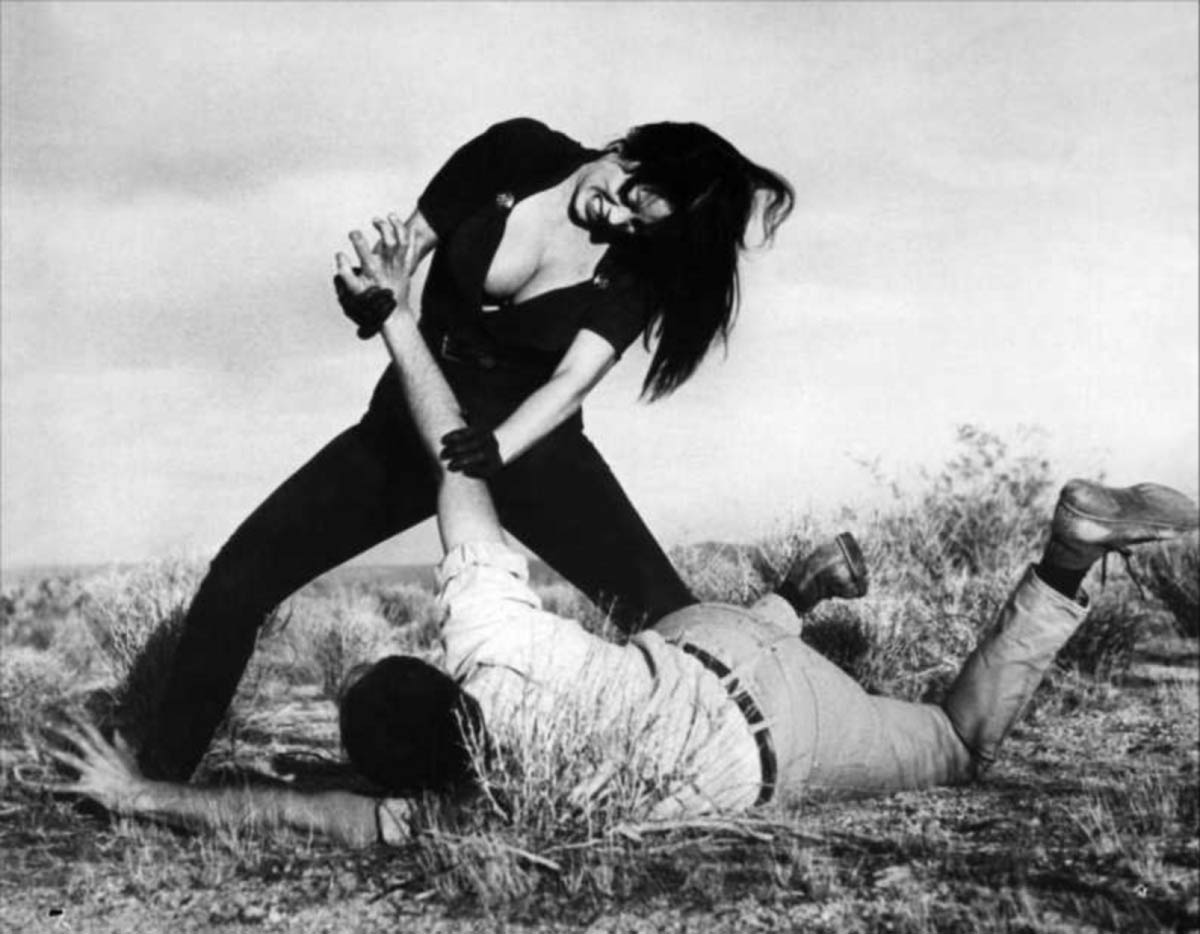
For a seemingly small film, Faster, Pussycat! Kill! Kill! left a big impact on pop culture. Although cheaply made and dismissed by most critics as just another trashy B-movie upon release, the exploitation film was deceptively influential on artists as diverse as Quentin Tarantino, Janet Jackson, and Daniel Clowes, while its title can be heard in everything from B-52 songs to Simpsons episodes.
John Waters, the aforementioned expert on and auteur of camp cinema, even declared it “the best movie ever made.” So how can such a crude low-budget film be so ubiquitous and beloved?
The truth is the film is pulpy and excessive in nearly every possible way, but there’s an art to it that makes it subtly brilliant.
The lead performance by former go-go dancer Tura Santana as, fittingly, a psychotic go-go dancer who kidnaps a teenage girl is one of the most iconic in all of cult cinema; Santana dominates every scene she’s in, all the while performing her own stunts and coming with much of her own dialogue.
And that dialogue is absolutely, mind-bogglingly stunning. This is a script to make Elmore Leonard cry; it’s the holy grail of exploitation movie screenplays, with pretty much every line worthy of being sewn into a throw pillow or framed in a nice picture frame in someone’s living room.
Lines like “Oh you’re cute, like a velvet glove cast in iron” and “I don’t beat clocks, just people” are tossed off faster than you can process them, both adding to the film’s distinct campy feel and elevating it to something far greater than that: a lurid thrill-ride of a movie that, in its own way, is a stone cold masterpiece of trash cinema.